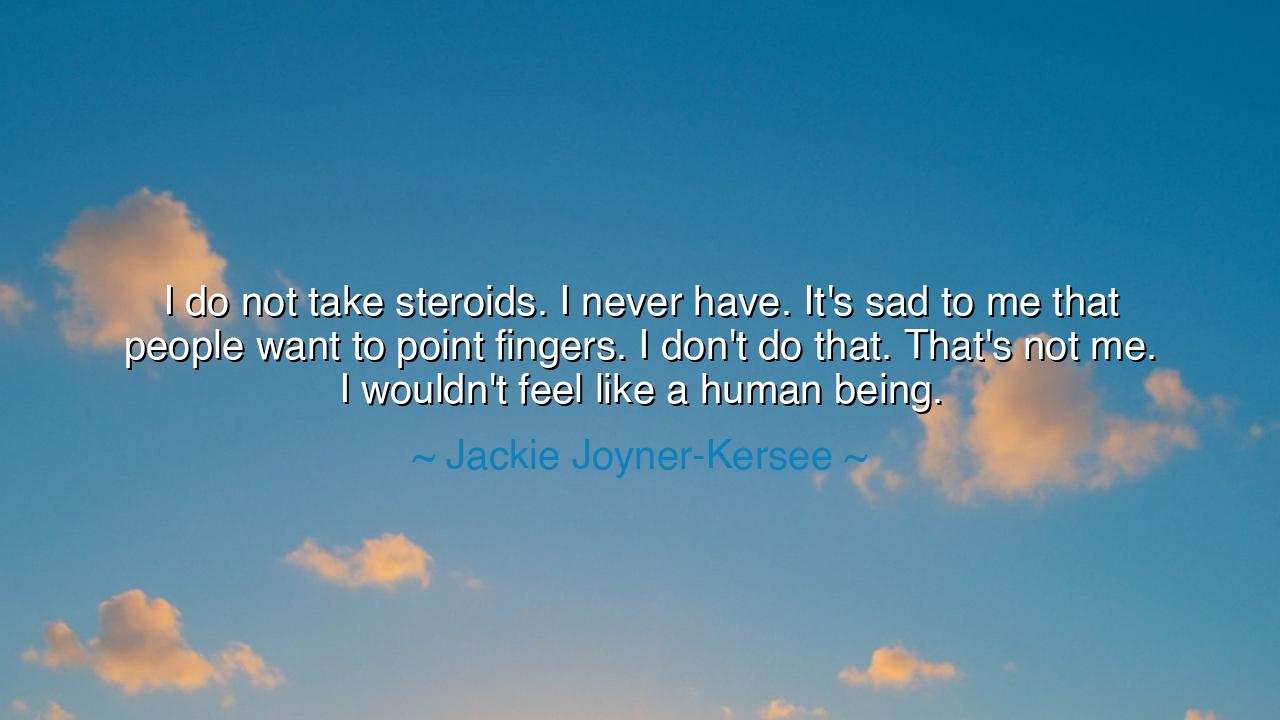
I do not take steroids. I never have. It's sad to me that people
I do not take steroids. I never have. It's sad to me that people want to point fingers. I don't do that. That's not me. I wouldn't feel like a human being.






Jackie Joyner-Kersee, the radiant champion of track and field, once declared with both sorrow and fire: “I do not take steroids. I never have. It’s sad to me that people want to point fingers. I don’t do that. That’s not me. I wouldn’t feel like a human being.” In her words lies the voice of one who has walked the long road of greatness, only to be shadowed by doubt not of her own making. They remind us that the crown of victory is heavy, not only with triumph but also with suspicion. Yet her refusal to compromise her integrity is itself a victory greater than medals.
The ancients knew that strength of body without purity of spirit was an empty thing. The Greeks, who first enshrined the Olympic Games, celebrated not merely the swiftness of the runner or the might of the wrestler, but the harmony of discipline, honesty, and honor. To cheat in the games was not only a crime against the contest, but a crime against the gods, for it corrupted the sacred bond between effort and reward. In her denial of steroids, Joyner-Kersee stands in this same ancient tradition: her greatness is not built on falsehood, but on discipline, toil, and the dignity of being true to herself.
Her lament that it is “sad” when people “point fingers” reflects another eternal truth: greatness always attracts suspicion. In Rome, when generals returned from conquest, they were paraded through the streets in triumph, yet behind them stood a slave whispering, “Memento mori”—“Remember, you are mortal.” The world has always sought to remind its heroes that they, too, can fall. Yet suspicion, when unearned, wounds the innocent. Joyner-Kersee’s sorrow shows us the cost of mistrust: how easily the labor of years can be overshadowed by the doubts of others.
Yet, her words also reveal a deeper strength. She declares that to betray her integrity would strip her of her very humanity. This is not the voice of an athlete alone, but of a soul who understands that true greatness is rooted not in performance but in character. To win by dishonor would be no victory at all, but a kind of death. Better, then, to carry suspicion with clean hands than to win the applause of the world with a corrupted heart.
History offers us many who faced this same trial. Consider Socrates, who was accused falsely of corrupting the youth of Athens. Though innocent, he accepted death rather than compromise his truth. Like Joyner-Kersee, he valued his integrity above his survival. Or recall Abraham Lincoln, accused often by his enemies of weakness and corruption, who replied not with anger but with steadfastness, letting his deeds prove his worth. So too does Joyner-Kersee’s answer stand as a shield: to accusations, she offers her character; to suspicion, her humanity.
The lesson for us is clear: guard your integrity above all things. For strength of body, wealth, or reputation may be taken from you, but the truth of your heart remains your own. When others point fingers unjustly, do not let bitterness poison you. Speak plainly, live uprightly, and let time reveal what slander cannot conceal. To betray your values for the sake of approval is to cease to feel like a human being—but to hold to them, even under fire, is to rise above the storm.
Therefore, let us live as Jackie Joyner-Kersee teaches us: let our victories be true, our work be honest, our spirits remain untarnished. When whispers come, let our lives shout louder. When doubts arise, let our deeds answer. And when temptation offers us the false crown of dishonor, let us remember: it is better to stand with clean hands in defeat than to rise in triumph with a poisoned soul.






AAdministratorAdministrator
Welcome, honored guests. Please leave a comment, we will respond soon